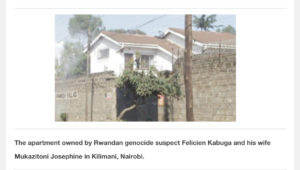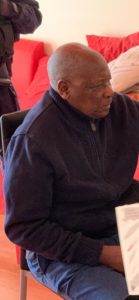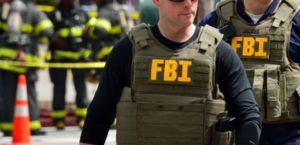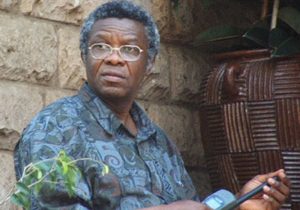Investigations
Kabuga In Kenya: A Story Of Money, Fear And A Trail Of Blood
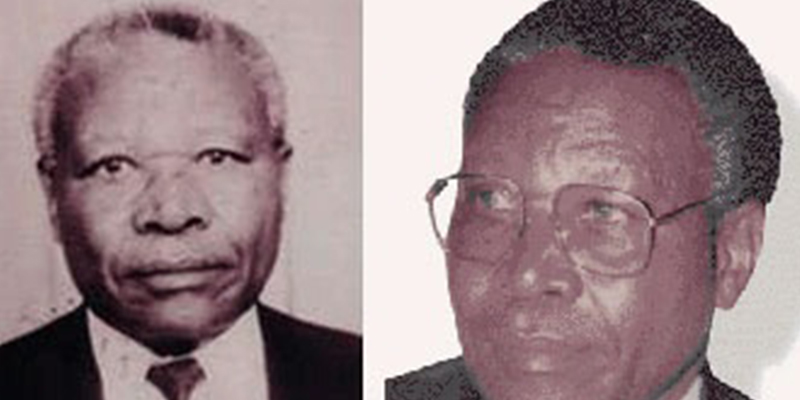
Kabuga, born in 1935, was a prominent political supporter and financial contributor to elements in the Rwandan government bent on committing genocide. He is accused of helping to plan a campaign of extermination that resulted in approximately 100 days of violence in 1994.
The Rwandan Genocide left 800,000 dead between April and June 1994 in a massacre that targeted the Tutsis, a minority ethnic group. Hutu militias began the killings after Rwandan President Juvenal Habyarimana, a Hutu, was killed when his plane was shot down in April 1994. The immediate conflict ended after a Tutsi militia, the Rwandan Patriotic Front, captured Rwanda’s capital city Kigali.
The allegations against him include giving violent extremist elements financial support for massacres, importing large quantities of weapons, and founding and directing the Radio Télévision Libre des Milles Collines, which broadcast messages inciting genocide. For these and other crimes the International Criminal Tribunal for Rwanda, now known as the International Residual Mechanism for Criminal Tribunals, indicted Kabuga on charges of genocide and war crimes and issued a warrant for his arrest.
Kenya Link
When former Kenyan dictator Daniel Arap Moi played host to Agathe Kanziga, widow of former Rwandan military dictator Habyarimana in the 1990s, many people believed he was consoling her and giving her survival tips in life as a widow considering his decades experience as a separated old man.
The case of Felicien Kabuga, however, could then later show what money can do.
He was a member of the privileged core of persons that surrounded the all powerful wife of Habyarimana and her feared brothers in the army.
With the domestic agitation for multiparty rule and the Rwanda Patriotic Front/Army (RPF/A) scoring victories on the battlefield, the ruling party MRND allowed other political parties to be set up. Kabuga used his wealth to thwart the progress of these parties by buying off members of the opposition, to sow disunity and infighting in the hope of frustrating coherence and elongating the stay of MRND in power.
Faustine Mugenzi and Pauline Nyiramasuhuko who thwarted the efforts of the Liberal Party, leaders of extremist CDR, Robert Kajuga and Ephrem Nkezabera the national leaders of Interahamwe were on Kabuga’s payroll.
With real possibility of a peace settlement in negotiations in Arusha, he set up and directed the operations of Radio RTLM, urging that the station should become the official radio of Hutu Power and funded Kangura Newspaper that were instrumental in indoctrinating the Rwandan people with an extremist Hutu ideology based on hatred and ethnic violence, and urging people to “work” by hunting and killing ethnic Tutsis during the genocide.
From 1992, through his company “ETS” Kabuga imported and distributed hundreds of thousands of machetes from Kenya in preparation for the genocide. Kabuga provided logistical assistance to the Interahamwe by supplying weapons and uniforms, and by providing transport to them in his company vehicles easing their mobility, speed and scale of massacres.
On April 25, 1994, in the prefecture of Gisenyi, Kabuga, and others reached an agreement to create the National Defence Fund (the Fonds de Défense Nationale-FDN) in order to provide assistance to the ordinary Hutu folks to kill Tutsis.
This fund was created in order to buy weapons, vehicles and uniforms for the Interahamwe and the army throughout the country.
Kabuga was appointed as President of the National Defence Fund’s Acting Committee. On May 20, 1994, Kabuga informed the Interim Government about the existence of this fund and counselled the government on how to manage and use it.
In June 1994, Kabuga and others held a meeting in Gisenyi, in which attendees made a list of Tutsis who had come from other prefectures to seek refuge in Gisenyi which lists, were given to the killers.
When the genocidal regime fell, Kabuga fled to Switzerland but was officially ordered to leave the country. He went to Kinshasa, Zaire before settling in Kenya under the protection of former dictator Moi, Zakayo Cheruiyot, a former powerful civil service chief and one of Mr Moi’s closest advisers and one of his (Kabuga) nephews. Cheruiyot became the MP for Kuresoi South on a URP ticket in 2013.
In an exclusive interview with API a Norwegian based blog, Kabuga revealed details of his stay in Kenya.
Kabuga confirmed that he had lived in Kenya for many years and travelled in and out of the country using different names.
He said a number of senior security personnel in Kenya always knew of his whereabouts and were good to him. However, he complained he had to part with a lot of money every month to satisfy their demands.. Some of them even facilitated travel documents in time of need. “I bought houses for 3 security men and gave a lot of money to others who wanted to establish private businesses that they will be engaged in when they soon retire.”
When asked why he had to leave Kenya in a hurry, he said the officers had become greedy and wanted more and mote, some even started to threaten him of arrest if he did not become more generous.
Warned of possible arrest
One evening at eleven pm, two officers summoned him to a car park near Carnivore and warned him of a possible arrest because two of his protectors had been transferred to another province and could no longer be around to intervene whenever there were discussions about what to do with him. Kabuga said the two men advised him to seek refuge elsewhere because if he were to be arrested in Kenya, it would become an embarrassment to the government and those who have protected him all these years would easily be targeted. Kabuga said the changes in Kenya politics had made life difficult for him. Moi was out of power and Kibaki took the reign. It affected his businesses and properties. The changes that were being made all the time in the security service by the Police Commissioner destabilised his protectors. Some were posted outside Nairobi to remote areas and that put his security in danger
“The political situation was also not conducive any more because my friends are shifting allegiance because of the political landscape”, Kabuga told API.
“I bought houses for three security men and gave a lot of money to others who wanted to establish private businesses that they will be engaged in when they soon retire,” he said in the interview.
The freezing of assets
When asked then what his reaction is to the court ruling in Kenya freezing his assets, Kabuga said he was angered and would not entertain such a thing. “It is my sweat and those who take it from me will be made to give back forcefully,” he says roaring, adding “I have never stolen from anybody and I will not accept a court ruling that steals from me. Many people will be angry if Kenyans steal from me. Someone is misleading the judge or bribing him. Otherwise how can he do this to me?”
Investigations by a joint team of CID officers and investigators from ICTR, Kabuga and his wife jointly own a Spanish Villa in Milimani, House No. 6 on LR No.1/1154).
Mr Kabuga acquired the property in 1995 and three years later, KTC Ltd was contracted by the couple’s daughter Bernadette Uwamariya to manage it.
Although the physical address of KTC Ltd is not known, the company had been collecting rent and depositing it in an account that was owned by Mr Kabuga at the Commercial Bank of Africa. The account was then closed in 2005 and the Sh3.4 million in it wired to an account Mr Kabuga co-owned with Ms Mukazitoni in Belgium. Since then, KTC has been wiring Sh290,000 in French Francs every three months to Banque De La Poste in Belgium.
Initially, the rents were collected by Kenya Trust Company Limited who used to deposit the same in the Account No.24872 of Kabuga at the Commercial Bank of Africa, Wabera Street.
Wealth in Kenya
According to ICTR documents, Felicien Kabuga is a wealthy Hutu businessman is believed to have vast interests in Kenya.
He is associated with three companies, including Hashi Empex Limited at View Park Towers, Ndimo Company limited, Zadok Transporters and Zadok United.
Zadok was incorporated on October 15, 1998 and given certificate number 82983.
The directors of the company listed as Francis Ngira Batware and Jean Bosco Simiye of post office box 13781, Nairobi.
A Nairobi lawyer Ms Lucy Masua of box 34546, Nairobi, filed the papers for the incorporation of the company.
A physical check at the company’s offices at Young Traders complex near city stadium did not yield much.
The office is located in godown number six; there is no sign or name on the gate.
Besides the transportation business, Zadok is also involved in furniture at a shop in Panari House along Mombasa road.
Another company, Hashi Empex has its offices on the fifth floor of View Park Towers where they deal in petroleum products.
The files for Hashi and Ndimo could not be located at the registrar of companies.
Kabuga’s real estate holdings are suspected to include a large house in Athi River town and the Spanish Villas flats along Lenana Road in Nairobi.
He, however, has registered these properties using proxies.
He is said to own shares in a Westlands shopping complex and another in Kericho together with a minister.
In Naivasha, Kabuga is said to own shares in a hotel in the town centre.
The fugitive is also said to own vast interests in farming including a farm in Kajiado district, Njoro in Nakuru District and Eldoret in Uasin Gishu District.
Kabuga is suspected to be one who bought a large tract of land in Kilifi District that was once owned by the family of former Rwanda president Juvenal Habyarimana.
In 2002 the US offered a reward up to US $ 5.000.000 for any information leading to the capture of Kabuga. In 1997, when Kenyan detectives raided a Nairobi townhouse where Kabuga was alleged to be hiding, they found only a note written by a senior Kenyan police officer, warning Kabuga of his impending arrest.
In 2002, 27-year-old businessman William Mwaura Munuhe reached the American Embassy in Nairobi willing to reveal the location of Kabuga ( after he and Kabuga had had a disagreement) but the involvement of senior Kenyan police left him lying on his bed with a bullet hole in his head.
It emerged that Munuhe had hatched a high profile plot to lure Kabuga out of his hideout and deliver the fugitive to the law. As anyone could guess, Munuhe would have pocketed over Sh300 million.
But something went tragically wrong. The hunted man apparently sensed danger and went after his pursuers.
Munuhe was found dead in his apartment, with a charcoal stove in the same room. Apparently, his killers wanted it to look like he died from carbon monoxide fumes.
But his relatives insisted Munuhe never had such a stove, nor did he use any such apparatus to cook.
Days later, it emerged that just before Kabuga could be ensnarled, Munuhe lost contact with his collaborators and calls to his cell phone went unanswered.
The police sensed something was terribly amiss and they went to his house, where they found that he had been dead for hours.
Kenyan police confirmed Munuhue was an associate of Kabuga and Cheruiyot. Mr Munuhe implicated former Internal Security permanent secretary Zakayo Cheruiyot after an extortion bid flopped. He claimed that the wanted man used his fortune to buy protection from Mr Cheruiyot. Mr Cheruiyot denied the claims.
The United States did not confirm or deny whether Munuhe worked for them but however accused the governed hiding the fugitive.
NTV investigations also uncovered shocking new details about the mysterious death of Michael Munuhe.
His brother, Josephat Mureithi Gichuki, was convinced that Munuhe was murdered because he was about to reveal Kabuga’s whereabouts to the US security agency.
The police verdict was suicide, he says, but all evidence in the room where his brother was found pointed to a violent and bloody confrontation.
Months after he was buried, a relative was sorting through his old clothes when he found a three-page letter written by Munuhe.
It detailed how he was abducted one Wednesday night at the Safari Park Hotel exit by three armed men and driven for nearly four hours in the locked boot of a car.
It is undated, but Munuhe’s elder brother was able to figure out that it was written in late December 2002, a few days before his death.
He eventually ended up in a dark room where he was beaten and tortured to reveal information about his relations with the FBI.
Eventually he was taken to a room where he came face-to-face with Kabuga, who was seated with three other men.
“Kabuga told me about the tapes they had on my conversations with Mr Scott (believed to be his FBI contact) and three people. He criticised me for betraying him and Cheruiyot”.
The name of then Internal Security permanent secretary Zakayo Cheruiyot has featured often in stories about Kabuga’s refuge in Kenya.
However, Mr Cheruiyot, now the MP for Kuresoi, has always strenuously denied any involvement.
The informant, told NTV that he worked in the same squad with Sarunei, and claimed that the name Sadiki Nzakobi was one of the aliases that Kabuga used in Kenya.
He gave NTV some documents allegedly from the Department of Defence headquarters, and copies of documents procured from the Third Battalion of the Kenya Army in Nakuru.
These appear to be evidence of the first attempts to legitimise Mr Kabuga’s stay in Kenya, after it became known that he was involved in the Rwanda genocide. The Department of Defence has dismissed the documents and neither NTV nor the Nation could independently verify their authenticity or origin.
The documents appear to suggest that Mr Kabuga moved from an asylum seeker, to captain in the army and was honourably discharged and offered diplomatic immunity.
The first letter was dated July 5, 2000. Its reference number is OP/DOD/0324/2000 and is addressed to the DoD commandant, written in reference to one Mr Sadiki Nzakobi.
It says that Sadiki has sought asylum in Kenya due to insecurity in Somalia and should be assisted with the necessary military documentation to enable him stay in the country safely. It also asks that he be assisted with personal security to enable him access his personal doctor, a Dr Peter Rwakwach, so that he can undergo treatment.
The letter bears the name of an S.K. Kamau, and was signed on behalf of the permanent secretary in the Ministry of Defence. We could not ascertain whether indeed such an individual ever worked at the Defence ministry.
The Department of Defence at the time was overseen by the Internal Security PS, then Mr Cheruiyot.
Colonel (retired) Dr Rwakwach is a medical practitioner who works in Nakuru and served in the armed forces as a military doctor, retiring in 2002. The doctor denied knowing anyone by the name Sadiki Nzakobi.
The second document bears the letterhead of the Kenya Armed Forces 3rd Battalion in Nakuru and is a request for legal documents for Nzakobi. It claims that Nzokabi was the commanding officer of the DCOY or Delta Company, for seven years, resigning on September 6, 1998.
Military intelligence
Another letter, also bearing the same letterhead followed up on the requests made in the letter from the permanent secretary’s office. The letter gave Nzakobi the authority to be treated in any military hospital.
Another letter, written on February 14, 2001 (Reference number OP/DOD/0652/2001) and also marked as confidential, states: “Please assist the above-mentioned person with military intelligence for his personal security. He is a person staying in this country under diplomatic immunity.”
This letter bears the name of James Theuri, on behalf of the Defence PS. Again, we could not establish whether this individual worked for the department and in what capacity.
The last document bearing the Kenya Rifles letterhead was a letter of discharge. This is the kind of letter any army officer would receive were he to have been honourably discharged.
John Namu, the NTV’s investigative journalists who followed this story, fled the country. All went well according to his recollection of the events until one photo of a businessman in Isiolo cast all doubts in the story he worked months on. “The man in this photo was brought out in a press conference addressed by former Kenya Police Spokesman Eric Kiraithe. Daniel Ngera, a businessman from Isiolo, had been forced into the frame by what Kiraithe called shoddy journalism on my part. I couldn’t respond because I wasn’t there to do so. My wife, our children and I had left the country the Friday before the story ran, and were just settling into life on the run. My heart sank and my stomach turned. At no point could I have ever imagined that an error I made would serve as a distraction from the existing facts about one of Rwanda’s most dangerous men.” He recalls.
In a speech given on August 28, 2006 during his visit to Kenya, then U.S. Senator Barack Obama accused Kenya of “allowing him (Kabuga) to purchase safe haven.”
The Kenyan government denied the accusation and described Obama’s statement regarding Kabuga as “an insult to the people of this country.” On Friday November 13, 2009 ICTR Chief Prosecutor Boubacar Jallow was likely to be in Kenya.
US Ambassador-at-Large for War Crimes Stephen J. Rapp, on Monday November 16, 2009, accused both the Kibaki and Moi governments of refusing to hand over the fugitive, with a price on his head, to the ICTR. Mr Rapp told a press conference in Nairobi that the US came closer to arresting Mr Kabuga in 1997, but the efforts were thwarted by the government of the time.
Mr Rapp, who served at the ICTR between 2005 and December 2006 and was also the chief prosecutor at the Special Court for Sierra Leone, said “Efforts were made to achieve cooperation but that failed.
In July 2012, Army marksman Michael Sarunei would become one of Kabuga’s casualties. Sarunei had told his family that his secret job was to guard Rwanda genocide suspect; he disappeared after taking photos.
The soldier was part of a shadowy unit set up by people close to the National Security Intelligence Service (NSIS) and the military or who appear to have had access to facilities controlled by the two institutions.
The unit provided security for the runaway genocide suspect, who has a Sh400 million bounty on his head, while he was hiding in Kenya even as the government denied knowing his whereabouts.
A relative of Sarunei was interviewed by NTV’s reporter John-Allan Namu in Rift Valley, where he produced the pictures of a man later identified as Kabuga and video images of a white government Land Rover in which Sarunei was driven away by his captors.
Said the source Ito Namu in 2012: “Four years ago Michael (Sarunei) began earning a lot of money. I asked him whether soldiers were getting paid better these days. He told me that he was working for a very rich man from Rwanda, who the government had wanted to keep in hiding, and that’s why he was getting paid a lot. Michael told me that the rich man who he and others were protecting was called Kabuga.”
Sarunei had reportedly told his relative that his bosses had ordered him never to reveal anything about the man they were protecting or he would be killed.
But Sarunei never heeded this warning. According to the source, in late 2008, when Kabuga was still in a Nairobi hospital, the soldier secretly photographed him. Unknown to him, the pictures were discovered by a colleague who alerted Kabuga and his protectors in government.
According to the relative, on February 13, 2009, Sarunei was led out of his home one morning into a government vehicle, registration GK 029K, never to be seen again.
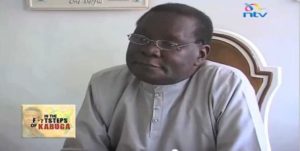
Photos | NTV and WILLIAM OERI | NATION Dr Peter Rakwach (inset), who was linked to Rwandan fugitive Felicien Kabuga in NTV’s investigative series died at MP Shah hospital Nairobi on July 10, 2012.
July 2012, Colonel (Ret) Dr J.K. Rakwach a medical practitioner who worked in Nakuru and served in the armed forces as a military doctor and retired in 2002, and was linked to Kabuga who he is said to have treated in the military facilities, died at MP Shah Hospital, his death came days only after being interviewed on the NTV’s investigative documentary.
A letter said to be from the Kenya Armed Forces 3rd Battalion in Nakuru asked Dr Rakwach to treat a man by the name of Sadiki Nzakobi, believed to be Mr Kabuga’s alias. (READ: Kenya Army men guarded killer Kabuga)
The letter bears the name of an SK Kamau, and was signed on behalf of the permanent secretary in the department of Defence. We could not ascertain whether indeed such an individual ever worked at the Ministry of Defence.
At the time, the Defence department was administered by the Permanent Secretary for Internal Security, Mr Zakayo Cheruiyot, who is now the MP for Kuresoi. Mr Cheruiyot denies that such an arrangement for Mr Kabuga ever existed.
When NTV traced Colonel (Ret) Dr Rwakwach at his Nakuru office recently, he also denied knowing anyone by the name Sadiki Nzakobi.
But it doesn’t end there, according to Adrian Blomfield, a Telegraph journalist based in Kenya, there was so much more as he narrates.
“Before he died, Ken Wafula told me that Felicien Kabuga was hiding out in Eldoret, where he allegedly owned a shopping centre. He said he was being protected by Kenyan intelligence and a certain prominent Kalenjin politician.
He told me that Meshack Yebei has called him shortly before Yebei’s murder to say he knew where Kabuga was hiding and he proposed Yebei and Wafula work together to report Kabuga’s whereabouts to the US embassy and then split the $5m reward.
Wafula said no because he was afraid. Following the murder of journalist William Gichuki, who was trying to trace Kabuga, he said a delivery man who accidentally knocked on Kabuga’s door in Eldoret, mistaking it for another house, was also murdered.
He claimed that Kabuga received regular treatment for his diabetes at a military hospital in Nakuru because he had been given a secret identity in the KDF as a colonel. He said that Kabuga often went to kisumu because he needed sunshine and he would go disguised as a woman.
He said that both the murder of Yebei and Eldoret Mirror editor John Kituyi May have been connected to Kabuga – though both might also have been connected to a political sponsored attempt to silence ICC witnesses.
As I have said before, it is possible that Wafula was just a conspiracy theorist. Arrest of Kabuga might give credence to that. But we cannot put this to him because Ken Wafula died in January, 2018 a few months after my conversation with him in his Eldoret office.”
The story of Kabuga is that of many twists that would make an epic movie. In Kenya, his money bought him freedom and lived a free, feared man.
Additional reporting by Daily Nation, NTV, The Standard and New Times.
Kenya Insights allows guest blogging, if you want to be published on Kenya’s most authoritative and accurate blog, have an expose, news TIPS, story angles, human interest stories, drop us an email on [email protected] or via Telegram
-

 Grapevine3 days ago
Grapevine3 days agoAlleged Male Lover Claims His Life Is in Danger, Leaks Screenshots and Private Videos Linking SportPesa CEO Ronald Karauri
-

 Lifestyle6 days ago
Lifestyle6 days agoThe General’s Fall: From Barracks To Bankruptcy As Illness Ravages Karangi’s Memory And Empire
-

 Americas2 weeks ago
Americas2 weeks agoEpstein Files: Bill Clinton and George Bush Accused Of Raping A Boy In A Yacht Of ‘Ritualistic Sacrifice’
-

 Business2 weeks ago
Business2 weeks agoCooking Fuel Firm Koko Collapses After Govt Blocks Sh23bn Carbon Deal
-

 Business2 weeks ago
Business2 weeks agoABSA BANK IN CRISIS: How Internal Rot and Client Betrayals Have Exposed Kenya’s Banking Giant
-

 Investigations1 week ago
Investigations1 week agoEpstein Files: Sultan bin Sulayem Bragged on His Closeness to President Uhuru Then His Firm DP World Controversially Won Port Construction in Kenya, Tanzania
-

 News1 week ago
News1 week agoAUDIT EXPOSES INEQUALITY IN STAREHE SCHOOLS: PARENTS BLED DRY AS FEES HIT Sh300,000 AGAINST Sh67,244 CAP
-
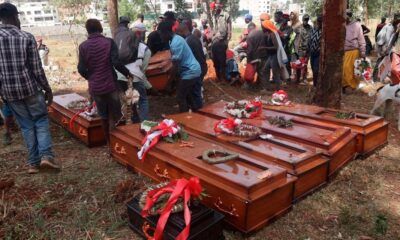
 News2 weeks ago
News2 weeks agoPuzzle Of Mysterious 15 Deaths of Street Children in Nairobi Under A Month and Mass Burials

